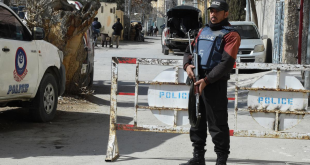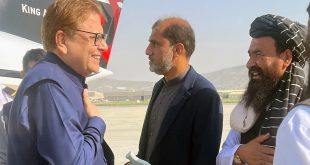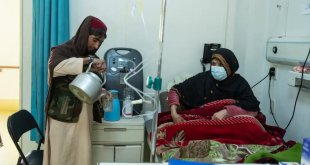“Peace in Afghanistan deserves all our efforts and commitment. Afghans have the right to start new and peaceful lives. They have already been very patient. The EU wants the real peace process between Afghans to start,” EU Special Envoy for Afghanistan, Roland Kobia said.
By Mansoor Faizy
On 28th September, Afghanistan held its fourth presidential elections since the overthrow of the Taliban in 2001. It is misfortunate that the result is not announced yet. But the core dot is that Afghans exercised one of the important pillars of democracy in the face of embracing threats. The fate of election is in doldrums as brawl between presidential contenders are getting edgy on passing every day. Afghan candidates and politicians have congratulated other countries on the victory of their elections. But they have forgotten the unknown outcome of their election. Simultaneously, the peace process is in full swing to find a political settlement in the Afghan conflict that no end thus far sees in sight. Though the process once was called off by President Donald Trump after a Taliban suicide bomber killed 12 Afghans and one American soldier in downtown of Kabul city, but eventually it has been resumed. In that time President Trump said the Taliban don’t have desire for peace. But recently, President Trump talked about his administration that has been working on a peace agreement with the group. When Trump visited Bagram US military base in north of Kabul, said that Taliban wants a ceasefire—a good news for the agonized Afghans who are bearing the brunt of war for over four decades now. Peace talks has been back on track as Trump’s Special Envoy for Afghan Peace, Zalmay Khalilzad resumed Taliban negotiations in Doha, the capital city of Qatar. But still there is no inclusion of the Afghan government in the talks. The uncertainty has placed two sensitive political issues in competition with each other; the elections, and the peace talks. Moreover a possible pullout of American troops has emboldened Afghanistan’s neighbors to seek a broader presence by offering help in the theater of peace quest. This scenario has raised many questions as to where Afghanistan might be possibly heading. Complicated reconciliation process, how peace talks would evolve, when the election results announce with what consequences, and how regional powers would help promote peace and satiability. To explore these questions, we have online interviewed Roland Kobia, the European Union (EU) Special Envoy for Afghanistan, who was also former EU Ambassador to Azerbaijan and Myanmar.
How do you see Afghan peace efforts?
Peace in Afghanistan deserves all our efforts and commitment. War needs to end. Afghans have the right to start new and peaceful lives. They have already been very patient.
On the peace efforts, I believe that we are currently at a crucial moment that should not be wasted. Opportunities are rare. There is still too much fighting, terrorist attacks and pain. But when I compare the current situation with two years ago, at least what appears to be a real and meaningful process of negotiation has been going on for months. This is good news as it is dialogue that will lead to peace, not the swords.
The EU wants the real peace process between Afghans to start. The government and the Taliban two things need to sit together and negotiate peace. The Government needs to be fully involved and negotiating peace directly with the Taliban. They also need to agree on holding a ceasefire during the negotiations. The EU has been calling for a genuine comprehensive ceasefire for some time.
Is President Trump’s visit to ‘Bagram’ of Kabul, will help accelerate peace talks?
It shows an interest at the highest level of the US administration, so that is positive. President Trump also called for a ceasefire, which is very welcome and should be taken seriously by all parties. He seems to want more than what was in the agreement early September. He also announced the resumption of talks between the US and the Taliban, which is an important step towards the launch of a formal peace process between the Government and the Taliban. I hope things can now move forward quickly to move on to the next stage, is the intra-Afghan negotiations.
Why so far US did not officially resumed peace talks with Taliban”
They have actually just restarted as we write. Things are in flux, and shades of grey exist on what this should be called. The important thing is to move as soon as possible to the next stage.
What is real reason behind Taliban’s opposition for direct talks with Afghan government?
You will have to ask the Taliban. I do hope that this obstacle can be overcome soon, and that, once an agreement between the US and the Taliban is reached, the Taliban will talk directly to the Government, as they have agreed to under the four-point package. If there is no real intra-Afghan negotiation, it will make the troops withdrawal more uncertain.
Why Taliban do not agree for a ceasefire to facilitate peace talks?
I think they have not yet made their minds about this. There might be different opinions inside the movement. They may see a ceasefire as a sign of weakness and being deprived of the leverage of violence. We believe otherwise: the more the country will walk on the path of peace and cessation of hostilities, the more and the quicker the troops will leave. Violence has led to 18 years of war, the paradigm needs to change. Our message to them is that a ceasefire will not only stop unnecessary suffering and bring much-needed relief to millions of Afghans, but will also create the right environment for the peace talks to prosper. A ceasefire would also help in having ordinary Afghans support what will no doubt be a complex peace process. It is a political position that a movement that has political ambitions should understand.
In September, when Trump called off peace talks, he said Taliban don’t desire for peace. Is it right?
I think the vast majority of Afghans want peace. They need to be heard.
How do you evaluate regional countries role in the Afghan peace talks?
Support by regional countries and the international community to the peace process is essential, but in the end this must be a process owned by Afghans. The EU has long called for the centrality of Afghans in the process.
It seems next round of intra-Afghan talks to be held in Germany, why Beijing conference failed?
We were never informed of any details about the gathering in Beijing so we don’t really know why it didn’t happen in the end. We need to move on, and progress, not create formats that would bring us backwards. I hope that Germany can build on the good success of the last July round of talks.
Do you see Afghan election as an obstacle ahead of peace process?
Not at all. On the contrary, the elections and the peace process support each other. They are two sides of the same coin. True, we would all have liked to see higher participation and a smoother announcement of the results, but the fact that so many Afghans defied the threats and went out to vote, shows how important it is for people to have their vote count. The elections are a key part of Afghanistan’s democratic development. In going to vote despite threats, intimidations and risks, Afghans have showed an example to the world.
As a whole, what role the EU will play in case of electoral deadlock.
It is for Afghans to make decisions. We think the results should be announced in a clear manner, so that all stakeholders, ordinary Afghans voters first of all, understand how the votes were counted and exactly how many votes went for each of the candidates. Once procedures are followed, there should be no deadlock but a clear and legitimate result that everybody should accept and support. The EU is working with other international partners, including the UN, in this direction.
What is your message (Sir) for the Afghan people?
My main message is that Afghans should not lose hope. I really believe that 2020 can be the year peace gradually comes out of the long tunnel.
 Afghanistan Times
Afghanistan Times




